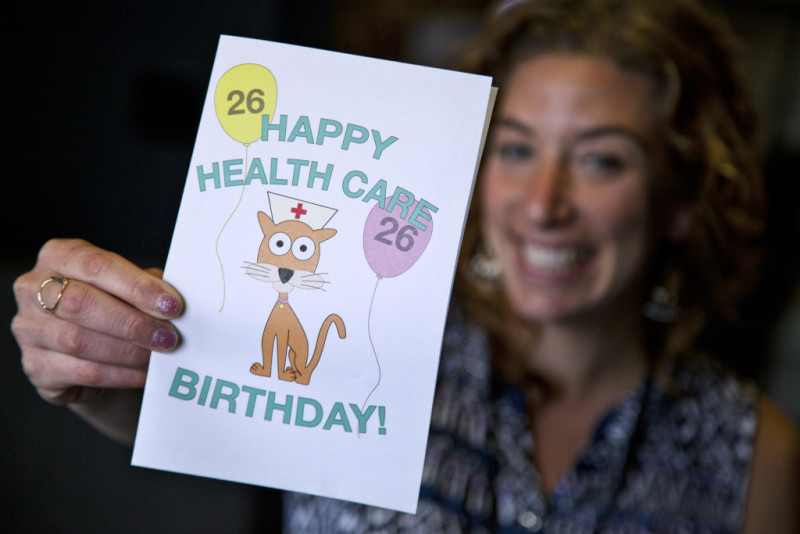Consider this: Just 29 percent of young adults say they feel very or somewhat confident in their understanding of health insurance terminology, according to a survey conducted by the Urban Institute and published on the Health Affairs blog in December 2013.
Here are some tips for navigating the crazy world of health insurance, if you -- or someone you know -- are buying insurance for the first time. (And here's a birthday card, created by Sugarman, that you can share with your friends when they turn 26!)
Consider What Type of Plan Fits Your Lifestyle, Budget
Whether you're buying insurance through Covered California or you're getting it through your employer, you're likely to encounter:
- Plans with a higher monthly premium and a lower annual deductible
- Plans with a lower monthly premium and a higher annual deductible
So which one is right for you? Gerald Kominski, director of the UCLA Center for Health Policy Research, says young people should look closely at their plan options and consider a few factors:
- What happens when I actually go to see the doctor?
- What happens if I need to go to the emergency room?
- How much am I going to have to pay before my insurance starts covering a portion of my medical bill?
My KPCC colleague Take Two producer Jacob Margolis selected a higher-premium, lower-deductible plan when he turned 26 earlier this year.
"I chose that one because I assumed that I'd be in the hospital more often," says Margolis, an avid cyclist. "About once a year I seem to have some catastrophic bike incident."
Sugarman chose the same plan. She explains, "I decided that I wanted to pay more every month," she explains, "knowing that I could have the peace of mind that if something drastic were to happen to me, I wouldn't have to worry about the financial part of it."
When it comes to deciding between higher-premium and higher-deductible plans, a lot of young people have made similar calculations. (If these words are already making your head spin, check out KPCC's glossary of health insurance terms.)
"The young people we spoke with felt they'd rather pay a bit more each month to prevent having to pay large sums out-of-pocket, in the event that something serious did happen," says Christina Postlolowski, health policy manager for the advocacy group Young Invincibles.
She notes that in both California and nationally, young people by and large have signed up for so-called Silver Plans, and "this was striking to see that our generation didn't just care about getting any plan, but wanted that comprehensive coverage that was going to protect their health as well as their pocketbook."
Get A Primary Care Doctor in Your Plan’s Network
Once you've selected an insurance plan, you need to find a primary care physician. If your longtime doctor is not in your plan's network, then you'll need to find a new one.
And that can be a challenge, as Sugarman learned. She called various doctors' offices and learned they weren't taking new patients or wouldn't accept her insurance.
"I just found that I was running into so much red tape, that I just didn't want to do it anymore," she says. "It was too complicated."
But even when you find an in-network doctor who's taking new patients, there's still more work to do. Claire Brindis, the executive director of the National Adolescent and Young Adult Health Information Center at UCSF, says young people should approach their doctor search from the perspective of a discerning consumer.
"For young adults, it's really important to feel comfortable with the way that they're treated, either on the phone, or whether they can set up an appointment at their convenience through an email process," she says, "So young adults need to be health consumers, to be sure that they feel positive about who they've signed up to be their provider."
Need incentive to find a primary care doctor? Once you have one, you can get an annual check-up that’s fully covered by insurance, as well as other preventive care that’s also covered, like vaccines, HIV and STI tests and depression screenings.
Get to Know Your Health Plan
Margolis wishes he'd found a primary care doctor before he left for a recent vacation in Mexico. He got sick while he was there and had to learn to navigate his new insurance plan while he was under the weather.
His advice? "Get everything together early, because then you'll go on a trip to Mexico City, get some sort of weird thing that's going to need all of these blood tests, and you're going to be rushing around trying to find a doctor to take care of you," he says.
And remember: If you don't understand how your plan works, don't be afraid to ask questions!
Of course, you can always turn to the internet for help. Young Invincibles offers these answers to your frequently asked questions. It's also developed a mobile app - called Healthy Young America - that helps you get insurance, find a doctor and calculate your discount.
